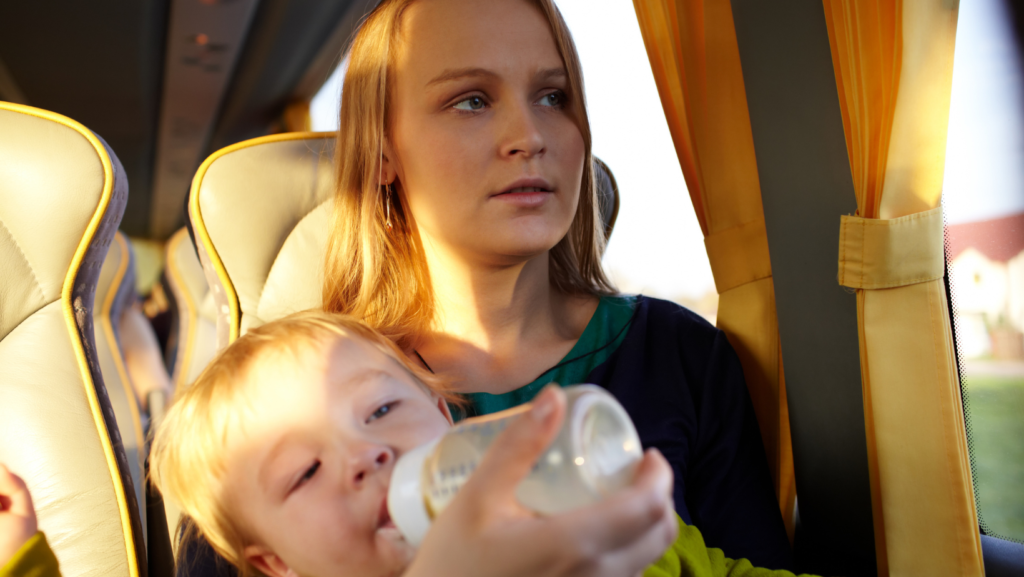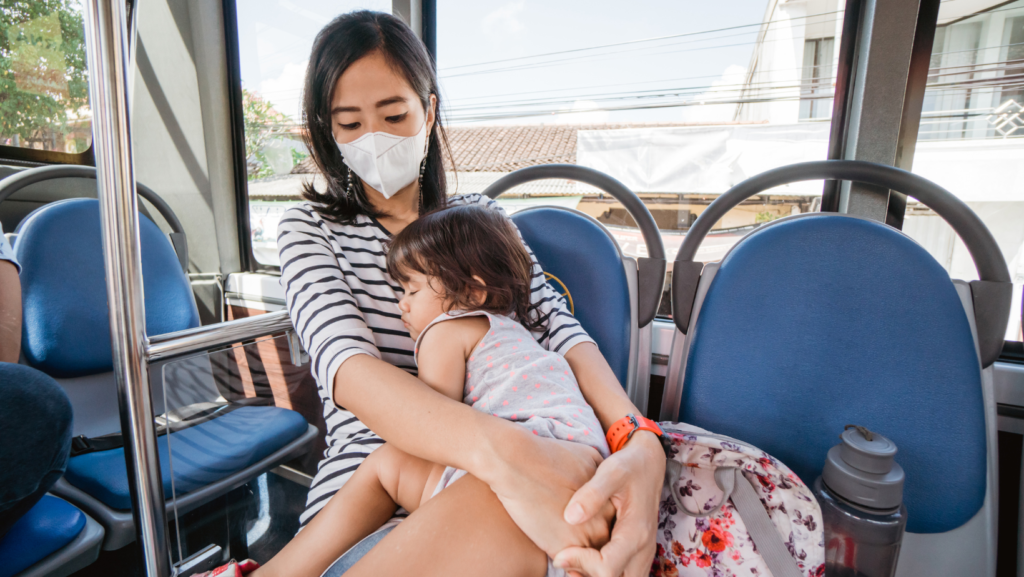It was two months before my wedding when a well-meaning older relative called my mother in a frenzy. She had heard neither my partner nor I own a car. In fact, we can’t even drive and have no intention of learning. The closest either of us has ever come to getting behind the wheel is a game of Mario Kart.
“How are Sarah and Brandon going to get the baby home from the hospital?” An aunt demanded of my mother, presumably terrified by images of our hypothetical newborn on the subway. At the time of the aforementioned phone call, I wasn’t even pregnant. The taboo of parenting without a car is so ingrained that my loved ones worried about the very idea of me raising a kid without a vehicle before I’d even conceived one.
Fast-forward to today: I have been a car-free parent for over three years now, and here’s what I’ve learned. Being car-less is perhaps one of the greatest taboos of modern parenting, but it shouldn’t be. Parenting and driving have become so synonymous that hospitals still insist new parents must prove they have a carseat before taking their newborn home. Simply put, it’s taken for granted that responsible parents can and should possess cars.
Sadly, the strange conflation of responsible parenting with car ownership obscures an important truth: parents shouldn’t have to own cars and the world would be better if it were radically redesigned so no one felt they did. I would contend that we, as a society, are simply so accustomed to shaming parents into acting as personal Uber drivers for their children that we’re unable to dream of new—and better—possibilities facilitated by better designed, better connected communities.
It’s difficult to find statistics on exactly how many families with young children do not have cars in Canada. However, we do know 83 per cent of Canadians in general own or lease a vehicle. In a major urban centre with reasonably good (albeit flawed) transit like the Greater Toronto Area, more than two-thirds of residents still have vehicles. One can infer from the data that there are many communities where the majority of parents are ferrying kids to ballet class in the backseat of a minivan rather than the kiddie seat of a bicycle.

When it comes to which came first—the social construction that responsible parenting requires cars or a society designed in a way that underserves car-free families—it’s a real chicken or egg scenario. Cars have been a dominant mode of transportation in Canada since the Post-War economic boom of the1950s, when restrictions on passenger vehicles and the rationing of tires ended. The rise of the automobile coincided with The Baby Boom, the generation that continues to be Canada’s largest. Cars were added to the (ever-growing) list of things good parents were expected to provide to prove their love for their children.
The popularity of automobiles in the second half of the twentieth century led to the rise in sprawling suburban areas in North America. These neighbourhoods were not built around high streets and certainly not designed with the idea of walkability. The underlying assumption of a suburban lifestyle is that people didn’t require proximity to corner stores or the town centre. Rather, if they needed something, they could drive to get it.
The cultural association between parenthood and cars only grew in the following years. By the 1990s, when millennial parents were kids, minivans had become a vehicular symbol for parenthood, which probably explains today’s proliferation of memes poking fun at the parents best known for driving them. That uncool reputation could also explain why Toyota tried to reclaim minivans as “swagger wagons” with a viral 2010 ad featuring two white parents rapping about their vehicle of choice.
In less than a century, cars have become as associated with parenthood as bedtime stories, midnight feedings, and The Wiggles. But who is benefitting from cars remaining a mainstay of modern parenting? The answer is certainly not families ourselves. The average annual cost of owning a car in Canada is $8,800. At a time when inflation is impacting Canadians’ ability to meet their day-to-day expenses, cars have never been harder to afford in recent memory. Even for those privileged families who can comfortably absorb the costs of having and maintaining vehicles, gridlock and the increasing threat of dangerous road accidents are undeniable problems. And let’s not forget that cars contribute to Climate Change, a force that’s making the planet unlivable for future generations (i.e. our own children). After some consideration, driving seems less and less appealing.
The fact that many hospitals require families to produce a carseat to prove they are ready to take a newborn home is as counterintuitive as insisting we should light up cigaretttes around our babies despite the well-documented dangers of secondhand smoke. Truly, it would be better for parents and our kids if we never had to drive anywhere.
Parents who choose to go car-free have different experiences depending on a variety of factors, such as the cities we live in, proximity of our homes to public transit, and the amenities available walking-distance from our respective neighbourhoods. As a Condo Mom raising a toddler in downtown Toronto, I am privileged to live a short stroll from every necessity, whether I need to escort my daughter to preschool or purchase her a new bathing suit at the Eaton Centre.Today, my three-year-old regularly proclaims, “We don’t have a car, we have a stroller!”
I’ve even been known to shock my loved ones by walking my kid to the emergency room at The Hospital for Sick Children. However, In my experience, speed walking a baby wrapped snugly in a cuddle bag to the ER takes less time than it would to negotiate GTA traffic and seek a parking space with a sick child in tow. Given how well we cope without a car, it baffles me that some family members still wonder aloud about when my husband and I will finally get our drivers’ licenses and buy a secondhand Honda (Sorry to our respective uncles, but the answer is never) .
Even in Montreal, a city widely believed to have the best public transit in Canada, parents who prefer subways to roadways still have to contend with side-eye. Jasmine, who prefers not to have her lastname published, has been raising her seven-year-old son without a car for four years. Each winter, Jasmine explains she hears passive-aggressive comments that sound like this: “You’re walking to school in this weather? Poor kid!” To people like that I say: thermal underwear and parkas are wonderful inventions!

For parents in downtown Toronto or Montreal, the judgment from people who don’t understand our car-free lifestyles is unpleasant, but in communities without robust transit systems, the obstacles are more serious than caustic comments. Anne Thériault is a writer and host of the podcast And Also Some Women. When she began life as a car-free parent, it was because she did not have the financial resources to pay for a vehicle. A decade later, she is proud of continuing to raise her kid sans car.
“I like to think that it’s my tiny contribution to the fight against climate change, and I genuinely love public transit and think it’s a net good,” Thériault says.
However, when her family relocated from Toronto to Kingston, Ontario, their car-less lifestyle got considerably more complicated.
As Thériault explains, “The biggest challenge is that now we live in a very car-culture city, and it’s hard to get anywhere that’s outside of the downtown core.”
A simple trip to Value Village is an expedition, she says, “involves a lot of planning and time.” Kingston, Ontario, which does have local buses and a train station, is nonetheless not known for its speedy or comprehensive public transit.
Rural people are even worse off. I shudder to think of what happens to carless families who, unlike me, do not live walking distance from world-class ERs. After all, what good is free healthcare when geography interferes with a family’s access to medical attention? The lack of options that result from poor transportation in rural communities can leave carless residents with few options but hitchhiking, a practice that puts people in the vulnerable position of getting in cars with strangers. In the case of far too many women—especially Indigenous women—such stories end with people going missing. More robust public transit infrastructure could help connect communities and save lives. We cannot afford to live in a country that continues to ignore such facts.
I am not naive. I know the vast majority of Canada’s communities are nowhere close to being “15-minute cities,” a buzzy term used to describe cities where all major amenities are conveniently within 15 minutes of any given community. But the magnitude of present Canada’s dependency on cars is not a reason to stop imagining a better future. It may be trite, but a dream of most of us who have children is to leave a better world behind for our children…
Like healthcare or childcare, reliable and affordable public transit is an issue that impacts all everyone in one way or another. It also has a special resonance for parents. Our kids deserve transit that doesn’t exacerbate the climate crisis. And of course, every child deserves access to the amenities needed to thrive, regardless of whether their parents want—or can afford—a car. It’s time to end the stigma associated with car-free parenting.
When it comes to parenting, it’s time to dream beyond the minivan.




